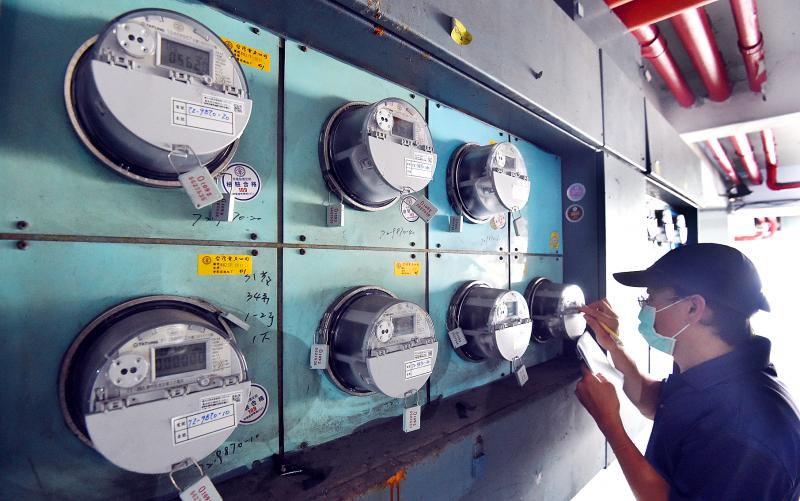Trade groups and academics yesterday expressed dismay at state-owned Taiwan Power Co’s (Taipower, 台電) electricity rate hikes, saying the drastic rise would make conducting business in Taiwan difficult and put pressure on corporate profitability amid rising economic uncertainty.
Taipower on Monday said that it would raise electricity rates by an average of 8.4 percent starting on Friday. The hike is to reach 15 percent for large industrial users, to reflect soaring international energy prices.
Lin Por-fong (林伯豐), chairman of the Third Wednesday Club, a trade group whose membership is limited to the top 100 firms in individual business sectors, said the rate hike is beyond reasonable and has to do with the government’s rejection of cheaper nuclear power.

Photo: Liao Chen-hui, Taipei Times
Lin said he supported the government’s carbon-neutral policy, but suggested that it consider adding nuclear power to the nation’s energy mix to make electricity more affordable.
Matthew Miao (苗豐強), chairman of the Taipei-based Chinese National Federation of Industries, said that electricity fees play a key part in shaping Taiwan’s industrial development and authorities should approach the issue from a strategic standpoint.
Taiwan would have difficulty achieving its goal of becoming carbon neutral by excluding nuclear power, Miao said, adding that renewable energy sources would be inadequate to meet electricity needs to support economic growth in the coming years.
The General Chamber of Commerce said it welcomed Taipower’s decision to spare hard-hit sectors such as gyms, movie theaters, department stores and restaurants from the rate hikes, but called on policymakers to add hotels to the exemption list.
Hotels should not be deemed as heavy electricity users until after the government lifts COVID-19 border controls, chamber chairman Paul Hsu (許舒博) said.
Manufacturers of metal products and machinery equipment in central and southern Taiwan said given the sharp rate hikes, they have to pass on the extra costs to customers to stay profitable.
Taiwan Association of Machinery Industry chairman Larry Wei (魏燦文) said the 15 percent rise was “too much” and well above an anticipated 8 percent increase.
The hike would undoubtedly drive up manufacturing costs, Wei said, adding that industrywide protests against the price rises could not be ruled out.
Taiwan Machine Tool and Accessory Builders’ Association chairman Habor Hsu (許文憲) said that the adoption of a “user pays” principle alongside a reasonable adjustment of electricity rates would allow for more efficient utilization of energy resources.
However, Hsu said the government should be fair in its distribution of subsidies, and not favor certain industries at the expense of others, adding that the process by which electricity rates are calculated should be open and transparent.
He urged Taipower to improve its operational efficiency so as not to waste scarce resources, and that the government keep electricity prices relatively stable to avoid overburdening manufacturers and businesses.
Dachrahn Wu (吳大任), an economics professor at National Central University, said the hike should be introduced in stages to mitigate the pain on local firms.
The rate hikes stem from policymakers overestimating the strength of Taiwan’s economy in the second half of this year, Wu said.
Chiou Jiunn-rong (邱俊榮), another economics professor at National Central University, said the rate hike should be applied to all users, rather than being limited to heavy users.
Companies would make efforts to save on power consumption, but people unaffected by the rate hikes would not appreciate the importance of energy conservation, Chiou said.
Additional reporting by CNA

NEW IDENTITY: Known for its software, India has expanded into hardware, with its semiconductor industry growing from US$38bn in 2023 to US$45bn to US$50bn India on Saturday inaugurated its first semiconductor assembly and test facility, a milestone in the government’s push to reduce dependence on foreign chipmakers and stake a claim in a sector dominated by China. Indian Prime Minister Narendra Modi opened US firm Micron Technology Inc’s semiconductor assembly, test and packaging unit in his home state of Gujarat, hailing the “dawn of a new era” for India’s technology ambitions. “When young Indians look back in the future, they will see this decade as the turning point in our tech future,” Modi told the event, which was broadcast on his YouTube channel. The plant would convert

‘SEISMIC SHIFT’: The researcher forecast there would be about 1.1 billion mobile shipments this year, down from 1.26 billion the prior year and erasing years of gains The global smartphone market is expected to contract 12.9 percent this year due to the unprecedented memorychip shortage, marking “a crisis like no other,” researcher International Data Corp (IDC) said. The new forecast, a dramatic revision down from earlier estimates, gives the latest accounting of the ongoing memory crunch that is affecting every corner of the electronics industry. The demand for advanced memory to power artificial intelligence (AI) tasks has drained global supply until well into next year and jeopardizes the business model of many smartphone makers. IDC forecast about 1.1 billion mobile shipments this year, down from 1.26 billion the prior

People stand in a Pokemon store in Tokyo on Thursday. One of the world highest-grossing franchises is celebrated its 30th anniversary yesterday.

Zimbabwe’s ban on raw lithium exports is forcing Chinese miners to rethink their strategy, speeding up plans to process the metal locally instead of shipping it to China’s vast rechargeable battery industry. The country is Africa’s largest lithium producer and has one of the world’s largest reserves, according to the US Geological Survey (USGS). Zimbabwe already banned the export of lithium ore in 2022 and last year announced it would halt exports of lithium concentrates from January next year. However, on Wednesday it imposed the ban with immediate effect, leaving unclear what the lithium mining sector would do in the